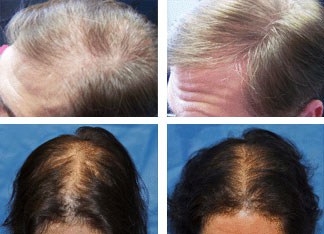Understanding Hair Growth Mechanisms
The relationship between facial hair growth and scalp hair loss has intrigued many, particularly among men experiencing male hair loss. The phenomenon often leads to questions about whether growing a beard might somehow influence hair loss on the top of the head. In this blog post, we want to take a few moments to delve into the intricate connections between beard growth and scalp hair loss, exploring the science behind these observations and addressing common misconceptions.
The Role of Hormones & Androgens
Hair growth is significantly influenced by hormones, particularly androgens like testosterone and its derivative, dihydrotestosterone (DHT). Testosterone is essential for the development of secondary sexual characteristics, which include facial hair growth. In contrast, DHT is often implicated in male hair loss, specifically androgenetic alopecia, commonly known as male pattern baldness.
- Testosterone: This hormone promotes the development of facial hair and is linked to overall hair health.
- DHT: While it supports beard growth, it can also lead to the shrinking of hair follicles on the scalp, resulting in hair loss in men.
Interestingly, the same hormones that facilitate beard growth can contribute to hair loss on the scalp. This paradox is rooted in the way different hair follicles respond to these hormones. Facial hair follicles tend to thrive under the influence of DHT, whereas scalp hair follicles may become miniaturized due to the same hormone.
- Follicle Sensitivity: The sensitivity of hair follicles to DHT varies, which explains why some men can have a full beard while experiencing significant hair loss on their heads.
- Genetic Factors: Genetic predispositions play a crucial role in how individuals respond to androgens, affecting both beard growth and scalp hair retention.

The Science Behind Facial Hair and Scalp Hair Loss
Research suggests that beards may serve a thermoregulatory function, helping maintain head temperature. This raises intriguing questions about whether growing a beard could be an evolutionary response to scalp hair loss.
- Heat Regulation: Men with beards might experience faster sweat evaporation, which can help regulate temperature. This adaptation could be a compensatory mechanism for the absence of hair on the scalp.
- Evolutionary Perspective: The theory posits that as men lose hair on their heads, the body compensates by promoting facial hair growth to maintain warmth.
Naturally occurring Dihydrotestosterone, or DHT, plays a dual role in hair growth, acting as a growth stimulant for facial hair while simultaneously contributing to hair loss on the scalp. This relationship is complex and varies from one person to another, even within the same family.
- Independent Functions: Studies indicate that testosterone supports the health of hair follicles, while DHT primarily affects facial hair. This means that high testosterone levels can lead to a fuller beard without necessarily causing scalp hair loss.
- Follicle Health: The health of hair follicles is not solely dependent on hormone levels but also on the genetic makeup of the individual.
Common Myths Surrounding Beard Growth and Hair Loss
Believe it or not, one prevalent myth surrounding the topic of hair loss is that growing a beard can actually lead to hair loss on the scalp. However, scientific evidence does not in any way support this claim!
- No Direct Causation: Research indicates that there is no direct link between beard growth and scalp hair loss. The two phenomena are influenced by hormones but do not cause one another.
- Individual Variability: The experience of hair loss is highly individual, with factors such as genetics and hormonal sensitivity playing significant roles.
Another misconception is that men who are bald cannot grow beards. In reality, many bald men have lush facial hair. As mentioned earlier, the ability to grow a beard is primarily influenced by testosterone and DHT levels, which can be present in men regardless of scalp hair status. In fact, many men choose to grow beards as a style statement, enhancing their appearance despite hair loss.
The Psychological Impact of Hair Loss and Beard Growth
Self-Esteem and Body Image
For many men, hair loss can significantly impact self-esteem and body image. The presence of facial hair can serve as a confidence booster.
- Facial Hair as a Confidence Builder: A well-groomed beard can enhance perceived masculinity and attractiveness, helping men cope with the psychological effects of hair loss.
- Social Perceptions: Studies suggest that bearded men are often viewed as more mature and dominant, which can positively affect their self-image.
Men experiencing hair loss often seek ways to manage their appearance. Growing a beard can be one effective strategy, since a beard can change the overall appearance, making baldness less noticeable and offering a new avenue for personal expression, and with various beard styles available, men can experiment with different looks that complement their facial structure and personal style.
Early Intervention is the Key to Preventing Further Hair Loss
At the end of the day, it is important to keep in mind that early intervention with appropriate hair loss treatment can significantly slow or even stop the progression of hair loss. By addressing the issue early, individuals can take proactive steps to preserve their existing hair and potentially stimulate regrowth. This is especially important as untreated hair loss can lead to further thinning and permanent baldness.

The benefits of early intervention in hair loss treatment are significant and can help individuals maintain a fuller, healthier head of hair. These include:
- Prevention of Further Hair Loss: Early treatment can help slow down or even stop the progression of hair loss, preventing it from worsening and leading to more severe thinning or baldness.
- Increased Chances of Hair Regrowth: The sooner treatment is started, the more likely it is that hair follicles can be stimulated to regrow hair, especially with effective treatments like minoxidil or finasteride.
- Maintaining Hair Density: Early intervention can preserve the density and volume of existing hair, allowing for a more natural look and preventing the need for more invasive treatments later on.
- More Treatment Options: Starting early gives individuals more options to choose from, as less advanced hair loss often responds better to non-invasive treatments like topical solutions, oral medications, or lifestyle changes.
- Reduced Psychological Impact: Addressing hair loss early can help minimize the emotional and psychological toll that hair thinning can cause. Maintaining a sense of control over the situation can improve confidence and self-esteem.
- Cost-Effective: The earlier you intervene, the less likely you are to need expensive procedures, such as hair transplants, which may become necessary once hair loss has significantly advanced.
Early intervention allows both men and women to preserve their existing hair, reduce the long-term impact of hair loss, and maintain their overall sense of personal well-being.
Practical Tips for Managing Hair Loss in Men and Beard Growth
Hair Loss Treatments
While there is no one-size-fits-all solution for hair loss, several treatments can help manage the condition.
- Minoxidil: This topical solution is known to stimulate hair growth and can be applied to the scalp. It is most effective when used consistently over time.
- Clinical hair loss treatment programs: Consulting a healthcare professional or qualified hair loss treatment specialist can lead to personalized treatments, including medications and non-invasive treatment options that target that target specific hair loss causes such as androgenetic alopecia.
For those looking to maintain a healthy beard, proper grooming is a must. Keeping a beard well-groomed can not only enhance its appearance but also prevent split ends. And using beard oils or balms can keep facial hair soft and manageable, promoting healthy hair growth.
Hair Loss Treatment in Jacksonville, Florida
The relationship between facial hair growth and scalp hair loss is complex and multifaceted. While hormones play a significant role in both processes, there is no direct causation between the two. Understanding the underlying science can help dispel common myths and empower men to make informed choices about their grooming and self-care practices. Whether embracing a beard as a style statement or exploring treatments for hair loss, the key is to focus on what makes one feel confident and comfortable in their own skin.
For additional information or to schedule a free, private consultation with an IHRS hair loss specialist in Jacksonville, we encourage you to contact us to schedule a private, one-on-one consultation where you can get all your hair loss related questions answered and determine which hair loss treatment option may be the most beneficial in your particular situation.


